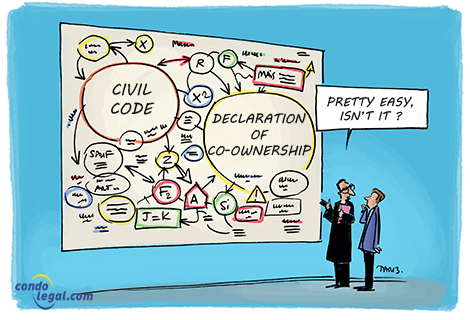 The syndicate acts as a legal person bringing together all the co-owners of the building and not each of them individually. The Civil Code of Quebec (C.c.Q.) provides that the syndicate of co-owners arises, by operation of law, at the time of publication of the declaration of co-ownership in the Land register. With the powers devolved to it by law and exercised by its two decision-making bodies, it thus expresses the autonomy of the community of co-owners. As a result, the co-owners are third parties to the syndicate. The assets of the syndicate are thus distinct from those of each co-owner.
The syndicate acts as a legal person bringing together all the co-owners of the building and not each of them individually. The Civil Code of Quebec (C.c.Q.) provides that the syndicate of co-owners arises, by operation of law, at the time of publication of the declaration of co-ownership in the Land register. With the powers devolved to it by law and exercised by its two decision-making bodies, it thus expresses the autonomy of the community of co-owners. As a result, the co-owners are third parties to the syndicate. The assets of the syndicate are thus distinct from those of each co-owner.
Despite the collective nature of this type of co-ownership, the legislator has not attributed to the syndicate the ownership of the common portions, which is distributed among the co-owners according to the relative value of their fraction.
Juridical personality
All the co-owners form the syndicate of co-owners, which has a juridical personality allowing it to have a name and a legal domicile. To carry out its objects conferred by Law, the syndicate of the co-owners has rights and duties. This means that it:
Main object
The syndicate has a very specific purpose, which is defined by article 1039 of the Civil Code of Québec: the preservation of the immovable (private and common portions), maintenance and administration of the common portions, the protection of the rights appurtenant to the immovable or the co-ownership, as well as all business of common interest. In order to avoid any ambiguity about the role of this legal person, a sentence has been added at the end of this section, following the adoption of Bill 16. It reads as follows: [The syndicate] must, in particular, see to it that the work necessary for the preservation and maintenance of the immovable is carried out. He is thus responsible for the conservation of the building as a whole, including the private portions, while he has only the administration of the common portions. He is thus responsible for the preservation of the building as a whole, including the private portions, even though he only manages the common portions. The rules established by the declaration of co-ownership strictly govern his actions, generally prohibiting any pursuit of profit.
Composition
To take its decisions, the syndicate acts through two bodies: the Board of Directors and the Meeting of the co-owners. The respective powers of these decision-making bodies are established by Law and by the declaration of co-ownership.
The Board of Directors (composed of one or more directors) manages the syndicate’s affairs and is responsible for the administration of the immovable. Its role is exercised on a regular and continuous basis.
The Meeting of the co-owners deals with issues of interest to all co-owners. It is also consulted on the budgets of the co-ownership and is empowered to take certain decisions concerning the co-ownership, such as the election of Directors and amendments to the declaration of co-ownership.
Collective heritage
As a legal person, the syndicate holds a patrimony that is distinct from that of each co-owner. It has a movable assets, consisting in particular of the common expenses paid by the co-owners, the sums accumulated in the contingency fund and the self-insurance fund and the claims that may be owed to it by both third parties and co-owners (e.g. unpaid common expenses). The syndicate may also own real estate, for example an apartment to house the janitor, a private portion, without constituting a common portion of the building.
 WHAT YOU SHOULD KNOW! A syndicate of co-owners has a name that is given at the time of its constitution, namely at the time of publication of the declaration of co-ownership. He exercises his rights and performs his obligations under this name. This name must comply with the law and include a statement clearly indicating the legal form it takes, namely that of syndicate of co-owners.
WHAT YOU SHOULD KNOW! A syndicate of co-owners has a name that is given at the time of its constitution, namely at the time of publication of the declaration of co-ownership. He exercises his rights and performs his obligations under this name. This name must comply with the law and include a statement clearly indicating the legal form it takes, namely that of syndicate of co-owners.
 WHAT TO KEEP IN MIND: No person other than an co-owner can be a syndicate member, nor may hold any rights in a syndicate. Neither the developer, once he has transferred all the fractions he owned nor the hypothecary creditors can be part of the syndicate.
WHAT TO KEEP IN MIND: No person other than an co-owner can be a syndicate member, nor may hold any rights in a syndicate. Neither the developer, once he has transferred all the fractions he owned nor the hypothecary creditors can be part of the syndicate.
 WARNING! A syndicate of co-owners may engage in an activity or identify itself under a name other than its own name. It shall give notice to the enterprise register by filing a declaration to that effect and apply for the registration of such a notice in the land register.
WARNING! A syndicate of co-owners may engage in an activity or identify itself under a name other than its own name. It shall give notice to the enterprise register by filing a declaration to that effect and apply for the registration of such a notice in the land register.




